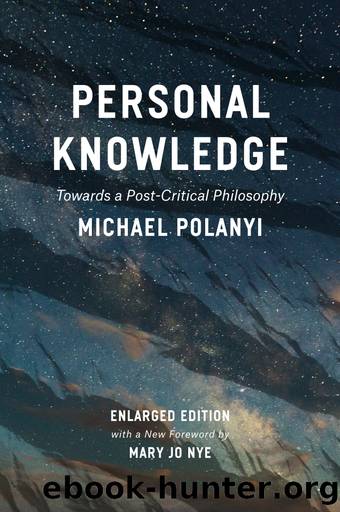Personal Knowledge by Michael Polanyi

Author:Michael Polanyi [Polanyi, Michael]
Language: eng
Format: epub
Publisher: University of Chicago Press
Published: 1962-07-14T16:00:00+00:00
14. MARXIST-LENINIST EPISTEMOLOGY
Since the rise of Greek philosophy in the fifth century B. C., men have been considering the possibility of systematically doubting what they believed in. Marxism is a relatively stable structure in which moral aspirations can be saved from self-doubt at the price of fixing them to the pursuit of a certain set of material ends. But a similar fixation seems to operate less successfully for artistic passions. While the people of the Soviet Union under Stalin did not lack a sense of moral purpose, they were bored with the official artistic products. And the attempt to identify the search for truth with the advancement of Soviet Communism has met with even greater difficulties. This had many reasons.
In spite of Hume’s scepticism and its antecedents, going back to ancient Pyrrhonism, there was no self-doubt among scientists in the modern free societies of the twentieth century. On the contrary, belief in science stood supreme as the only belief that remained practically unchallenged. Indeed, according to the positivist view widely disseminated since Comte, all human thought was seen engaged in a humble pilgrimage towards scientific perfection, and to Marx and Engels natural science was the archetype of objective truth: to them science was definitely not an ideology to be unmasked now, and to be later identified with the victory of Socialism. But once the fundamental dynamo-objective coupling is firmly established for moral passions, it inevitably tends to become extended to science on the same lines as to artistic pursuits. The neo-Marxian theory of science first rose to importance around 1930 and became within the subsequent decade the official doctrine of the U.S.S.R. under Stalin. At first it was limited to re-interpreting the history of science, showing that each step in its progress occurred in response to practical needs. To claim independent status for pure science was ridiculed as mere snobbery.38 Then, from the unmasking of science as being really technology, there followed the glorification of technology as being really science. And since technology achieves material welfare, it was accepted as part of progress and of Socialism itself; so that the pursuit of science became at last embodied in the advancement of Socialism.
So far this was harmless nonsense. But soon unmasking became more virulent. It began with scattered sniping at the more modern developments of ‘bourgeois science’, in relativity, quantum mechanics, astronomy, psychology, and it culminated in the campaign against Mendelism. The new position was finally established when in August, 1948 Lysenko triumphantly announced to the Academy of Science that his biological views had been approved by the Central Committee of the Communist Party and members rose as one man to acclaim this decision.
The universality of science was now definitely repudiated. The claims of bourgeois science to universal validity were unmasked as deceptive ideology, while Soviet Science was directed to rely frankly on its partisan or class character. Owing to the dual mechanism of Marxism, the doctrine that all science is class science served simultaneously both to discredit bourgeois science and to accredit socialist science.
Download
This site does not store any files on its server. We only index and link to content provided by other sites. Please contact the content providers to delete copyright contents if any and email us, we'll remove relevant links or contents immediately.
The remains of the day by Kazuo Ishiguro(7543)
Tools of Titans by Timothy Ferriss(6937)
The Black Swan by Nassim Nicholas Taleb(6184)
Inner Engineering: A Yogi's Guide to Joy by Sadhguru(5887)
Giovanni's Room by James Baldwin(5873)
The Way of Zen by Alan W. Watts(5790)
The Six Wives Of Henry VIII (WOMEN IN HISTORY) by Fraser Antonia(4785)
The Power of Now: A Guide to Spiritual Enlightenment by Eckhart Tolle(4749)
Astrophysics for People in a Hurry by Neil DeGrasse Tyson(4614)
Asking the Right Questions: A Guide to Critical Thinking by M. Neil Browne & Stuart M. Keeley(4566)
12 Rules for Life by Jordan B. Peterson(3724)
The Ethical Slut by Janet W. Hardy(3494)
Skin in the Game by Nassim Nicholas Taleb(3456)
Housekeeping by Marilynne Robinson(3396)
The Art of Happiness by The Dalai Lama(3378)
Double Down (Diary of a Wimpy Kid Book 11) by Jeff Kinney(3267)
Skin in the Game: Hidden Asymmetries in Daily Life by Nassim Nicholas Taleb(3259)
Walking by Henry David Thoreau(3228)
12 Rules for Life: An Antidote to Chaos by Jordan B. Peterson(3196)
